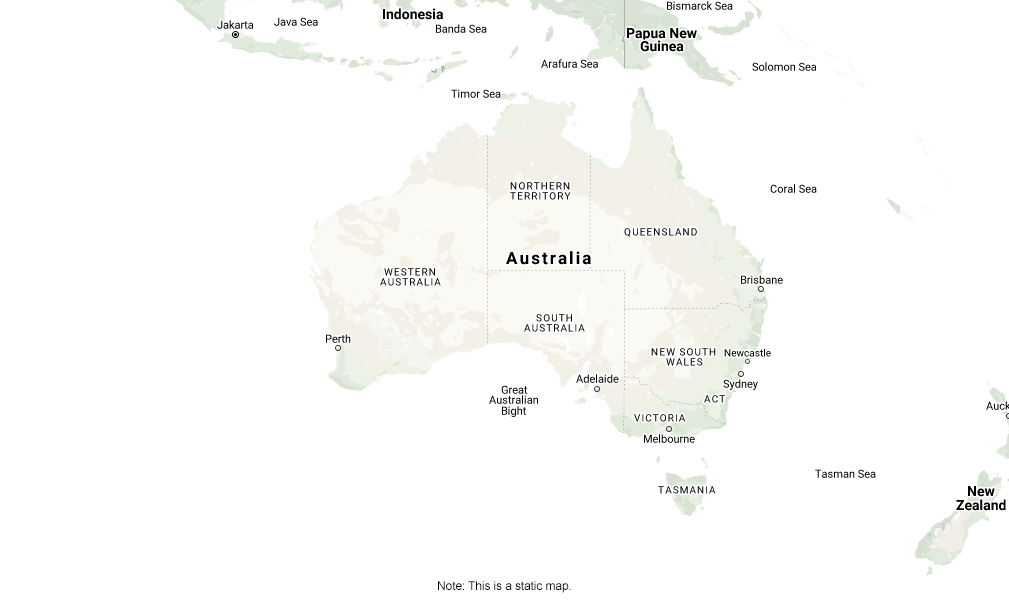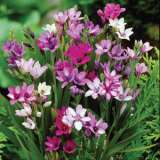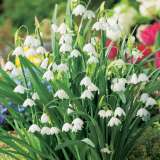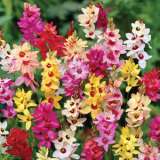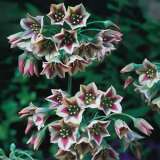Peacock Iris
Pack of 4
Peacock Iris (Moraea aristata) have beautiful large white blooms with a deep iridescent blue eye on each petal.
A very easy to grow bulb, the Peacock Iris is best left in the ground to naturalise, and unlike most bulbs, prefer to be grown in the garden rather than in a pot. Likes a full sun to partly shaded position, and must have a well drained soil.
Supplied as dormant bulbs
CAUTION Harmful if eaten
Orders containing this item will be dispatched from March.
Important Reminder: While we take great care in the realistic representation of our products, many variables such as climatic conditions, natural variation or manufacturing changes may affect the precise appearance of each variety. Generally, images used are of mature specimens whilst supplied stock may be dormant or juvenile plants that will develop with time. The images are intended as a guide only.
- Suitable for areas with full sun
- Suitable for areas with part shade
- Ideal in pots or containers
- Suitable to cut for vases
- Plant 10cm apart
- Grows to 25-35cm high
- Winter- Spring
- Ideal Growing Regions:
 Cool
Cool Temperate
Temperate Arid
Arid Semi-arid
Semi-arid Mild Tropical
Mild Tropical Tropical
Tropical- View growing regions on the Climate Map
Availability: OUT OF STOCK/OUT OF SEASON! Available to order from January to May, unless sold out.
$9.90
Multibuy Prices
Buy 2 or more of this item and get them for $9.40 per item
Buy 5 or more of this item and get them for $8.90 per item
*Price adjustments will be reflected in the cart.
Out of stock
Send me an email when this item is back in stock.
Not for the following state due to quarantine restrictions
- TAS
Money-Back Guarantee
 GUARANTEE & RETURNS:
GUARANTEE & RETURNS:
At Garden Express, we want to ensure that you have a positive purchasing experience. On the off chance your plants get stuck in the mail or haven’t arrived in the best condition, we ask that you reach out to us promptly with any concerns or issues. You can contact us via email at [email protected] or by phone at 1300 606 242, Monday to Friday EST, contacting us through social media platforms may be less reliable, so we encourage you to use our email.
Please note that it’s important to get in touch with our customer service team within 7 days of receiving your order if you have any concerns as claims regarding arrival condition after 7 days of arrival will not be recognised.
Please also remember not to dispose of any items until you’ve spoken to us, as to be eligible for a replacement, credit, or refund, we may request photos or additional information for any item(s) in question.
If you need to make a return, please contact our Customer Service department via email at [email protected] or by phone at 1300 606 242 for authorisation before proceeding. Once again contacting us through social media platforms may be less reliable, so we encourage you to use our email or phone number for a smoother experience.
It is also important to mention that discounted ‘end-of-season’ stock is sold on an ‘as is’ basis and is exempt from this guarantee. While this stock is generally sound, we recommend planting these items as soon as possible.
Our team packs and dispatches each day based on the best timing of delivery service to your state. This way we can ensure your order is in transit for the shortest time possible.
Delivery is normally via Australia Post with larger orders delivered via StarTrack Express* courier. We service virtually all areas of Australia with only those areas not serviced by these organisations being excluded (e.g. remote islands and Territories such as Christmas Island, Lord Howe Island, Norfolk Island, Cocos Islands, Groote Eylandt). We do not deliver outside Australia but happily deliver orders placed from overseas for Australian delivery. Our regular delivery charge for basic items is $12.50 Australia-wide, regardless of the number of items ordered. Due to their higher freight costs, bulky or heavy products such as roses, large pots and a small number of hard goods have higher delivery charges. The summary of all current delivery options is:
- Basic Postage $12.50: Applies to orders NOT containing Roses, 120mm and larger pots/grow-bags, Bare-rooted Trees, Composting Buckets, nor any items with individually specified delivery charges, all delivered at one time, will incur the normal $12.50 freight charge. These items are referred to as “Basic Items“.
- Roses & Larger Potted Items $16.90: Applies to orders containing bush Roses, 120mm up to 155mm pot/grow-bags, Composting Buckets, together with other products delivered at the same time will incur a $16.90 freight charge. **Please Note: Multiples of these items may incur a larger freight fee depending on the quantity of pots in the order; this will be calculated at the checkout.
- Small Trees & Large Pots $25.50: Applies to orders containing Trixie Fruit Trees, Dwarf Fruit Trees, Lilac Trees, Standard and/or Patio Roses, 160mm up to a 200mm pot/grow-bags, together with other products delivered at the same time will incur a $25.50 freight charge. **Please Note: Multiples of these items may incur a larger freight fee depending on the quantity of pots in the order; this will be calculated at the checkout.
- Trees up to 1m $35.00: Applies to orders containing smaller bare-rooted trees up to 1m in height. Larger items or pots/grow-bags greater than 200mm, together with other products delivered at the same time, will incur a $35.00 freight charge. Remote areas may incur an additional Freight charge but we will notify customers individually if this is the case. **Please Note: Multiples of these items may incur a larger freight fee depending on the sizes and quantity of items in the order; this will be calculated at the checkout.
- Trees 1m up to 1.49m $50.00: Applies to orders containing bare-rooted trees between 1 to 1.49m in height. Bare Rooted trees 1m to 1.5m in height, together with other products delivered at the same time, will incur a $50.00 freight charge. Remote areas may incur an additional Freight charge but we will notify customers individually if this is the case. **Please Note: Multiples of these items may incur a larger freight fee depending on the sizes and quantity of items in the order; this will be calculated at the checkout.
- Trees 1.5m up to 2m $85.00: Applies to orders containing bare-rooted trees between 1.5 to 2m in height. Bare Rooted trees 1.5m to 2m in height, together with other products delivered at the same time, will incur a $85.00 charge. This consists of $65.00 Freight Fee and $20 Oversize Surcharge, as charged by the Courier. Remote areas may incur an additional Freight charge but we will notify customers individually if this is the case. **Please Note: Multiples of these items may incur a larger freight fee depending on the sizes and quantity of items in the order; this will be calculated at the checkout.
- Trees 2m up to 3m $135.00: Applies to orders containing bare-rooted trees between 2 to 3m in height. Bare Rooted trees 2m to 3m in height, together with other products delivered at the same time, will incur a $135.00 charge. This consists of $95.00 Freight Fee and $40 Oversize Surcharge, as charged by the Courier. Remote areas may incur an additional Freight charge but we will notify customers individually if this is the case. **Please Note: Multiples of these items may incur a larger freight fee depending on the sizes and quantity of items in the order; this will be calculated at the checkout.
- Orders containing products with explicitly stated delivery charges will incur charges as detailed in the individual product description.
- Express Post: If you require your order to be sent Express Post, please call our office and we will arrange a quote. Please Note: Quarantine orders cannot be sent using Express Post; our experience is that it will actually delay your order due to the inspection process required for entry into these states.
- Order Split Fee: Some items may be delayed due to climatic or growing habits prevent them from being harvested at the time of being offered for purchase. You will be offered a choice to wait until all items on your order are available or to receive what is currently available for an additional freight charge of $5.00.
- We continue to maintain the simplest form of postage costs for the large variety of products we range, however in occasional circumstances of oversized orders and/or delivery location, the cost of freight can significantly impact delivery of an order therefore we reserve the right to refuse the order or contact the customer to discuss freight options and pricing.
Orders containing products from two different seasons (eg Rose or spring bulb pre-orders) that require separate deliveries will incur two delivery charges at the relevant rates (unless a free freight offer applies). A $5.00 Quarantine Inspection Surcharge applies in addition to the Delivery Charge for orders delivered to Tasmania, Northern Territory and Western Australia due to the increased complexity of quarantine requirements.
As quarantine inspections apply to each delivery, 2 quarantine charges will apply where orders contain products from different seasons. *Please note that if you order large items (eg Patio, Standard or Weeping Roses, Fruit Trees) you must specify a street address for the delivery address. StarTrack Express generally do not deliver to PO Boxes or RSD addresses so your order will be held until a suitable address is obtained. In rural areas, StarTrack may deliver to physical addresses such as general stores that act as Australia Post agencies but we suggest you check with them first. Where ”Free Delivery” vouchers apply to an order, details of the voucher should be entered in the “Your message to us” field. Orders (except Pre-orders) are normally despatched within 7-14 working days from the time of ordering during busy periods. Delivery times may be extended during peak periods (typically following the release of the latest catalogue), extended public holidays, if extreme weather conditions are not suitable for live plant transport or as detailed in the product description.
Individual items may be back-ordered to avoid delaying the delivery of other items. Please allow additional delivery time for orders to Tasmania, Northern Territory and Western Australia due to quarantine restrictions.
Please note: Some orders may not be possible to parts of Australia due to quarantine and some items may carry unique delivery charges. Check full delivery policy.
General Information: Spring flowering bulbs are usually planted in Autumn, once the heat of Summer has left the soil. In most climates this is any time from April onwards but we recommend waiting until May to begin as this will ensure the soil is cool enough in most areas.
Storing Bulbs Till Planting Time: In order to ensure a beautiful display once spring arrives, please ensure you follow these instructions:
- Store bulbs until planting time in a cool, dry airy position (about 20 degrees and not in the fridge)
- If bulbs are in paper bags, open these to allow an adequate airflow. Bulbs in vented plastic bulbs should have adequate ventilation if left in the bags they have been received in.
- In areas with a mild winter, Tulips and Hyacinths will need to be refrigerated to ensure strong healthy flower stems. Place into the crisper part of the fridge in April, for planting in May- a maximum of 6 weeks in the fridge is adequate; any longer will over chill the bulbs and could cause flower deformities. Ensure bulbs are not anywhere near ripening fruit and vegies during storage or refrigeration.
Planting Width: Varies depending on the species. (refer to measurements in the catalogue.)
Depth: Planting depth for bulbs is very important. Generally speaking most bulbs need to be planted twice as deep as the bulb is high, so the smaller bulbs are planted fairly shallow but the larger ones are planted quite deeply. In pots all bulbs need to be planted no deeper than 2/3 down in the pot so there is adequate room for root development. If planting larger bulbs into pots ensure a deep anough pot is selected to allow for this.
Positioning: Most bulbs Full Sun to Part Shade
Soil: Well Drained soil is essential to prevent bulbs from rotting.
Watering: Spring bulbs are fairly water wise and do not need any extra watering while they are dormant. Once bulbs have begun to emerge from the soil ensure they are kept well watered all through their growing phase.
Fertilising: For best results ensure that the soil is well dug and prepared with organic matter such as well-rotted animal manure, blood and bone or leaf mould. Mulch well to conserve water and keep roots cool. For planting in pots we recommend a potting mix specifically for bulbs. Once bulbs are coming into flower it is important to fertilise again as this will give the bulb enough energy to ensure the flower is set up for the following year.
Lifting and Storage: Most bulbs can be left undisturbed for many years and need to be divided only when the clumps become very crowded. If you wish to lift your bulbs, make sure they are completely dormant and the foliage has browned off before digging. Store in a cool dry area away from vermin if replanting cannot be done immediately.
Common Questions:
Why won’t my bulbs flower?
There could be many reasons why.
- Bulbs have not been ‘fed’ in a couple of years (Planting into a well prepared garden bed with a specialized bulb food or general purpose complete fertiliser, and again when flowering to allow plants enough energy to ‘set’ flowers for the next year.)
- Feeding has been with a high-nitrogen fertilizer. (This encourages production of leaves, but at the expense of flowers)
- Bulbs are planted in a shady area. (Most spring flowering bulbs need a half-day of sun at least to produce flowers. Most bulbs will cope with bright shade but not deeply shaded positions.)
- Bulbs are in competition for food and water with other plants. (Planting under evergreen trees or with other fast-growing plants limits the food they can get. Result: weak plants and no flowers.) If this is the case, pay special attention to a regular fertilizer and watering regime.
- Bulbs are planted in an area with poor drainage. Most bulbs love regular watering but must have good drainage. They do not do well where the water puddles. If this is the case, they are weakened by bacterias, fungus or other problems and will rot.
- Plant leaves were cut too soon or tied off the previous year. (All bulbs replenish their bulb for about six-eight weeks after they bloom. The bulbs should be fed at flowering time and kept watered in dry areas for about this long after blooming. The leaves should not be cut off or blocked from sun until they start to lose their green and turn yellow. This signifies the completion of the bulb rebuilding process, and it is then safe to remove foliage or dig up.
- Bulbs may be stressed from transplanting. (Some varieties seem to skip a year of blooming if dug and replanted in a different environment. Some varieties bought in from one climate may have a difficult period of adjustment to a vastly different climate. They may bloom the first year off the previous year’s bulb, but then be unable to adequately build a flower for the following year.
- Growing conditions the previous Spring/ Summer may have been inhospitable – the reformation of the bulb was affected. (An early heat wave may have shut down bulb rebuilding before it was complete. The bulbs may have be grown in a smallish pot without adequate feeding or protection from heat and cold.)
- Bulbs may have been growing in the same spot for many years and need dividing. After a few years of strong growth and multiplication many bulbs need to be divided. Do this by gently digging around the clump once foliage is brown and lifting bulbs out of the ground. Separate and plant about 12-15 cm apart, 2-3 times the depth of the original bulbs. Ensure fertilizer is added to the soil at planting time. Bulbs will probably not flower for another full season after doing this. If your clump is getting quite dense after a few year, pay particular attention to fertilising at flowering time to assist with next year’s flowers.
- Many bulbs require a cool winter to enable them to set adequate roots and grow strong stems. If winter temperatures do not go below 4 C, the bulbs may need to be chilled for 4 weeks before planting. Bulbs in this group are: Tulips, Hyacinths, Crocus and Daffodils.
- In warmer climates it is often usual for many spring flowering bulbs to be treated as annuals (flowers diminish year after year). This is because the weather warms up very quickly and does not allow the plants adequate time to ‘set’ flowers for the following season.
Legend
Establish which coloured region you live in and then consider the varieties listed as typically suited to that area. The Australian Climate Guide map is intended as a guide only as climatic conditions vary between specific locations. Factors such as local altitude, wind and the proximity of hills, mountains and bodies of water can cause variations from the generalised climate map. Note also that although a plant may be listed as suitable for a particular region, it may still require protection from extremes such as frost or strong winds. You should also consider its requirements for sun, shade and water.
Remember that you can often extend the range of plants that you can grow by creating micro-climates within your garden. Planting under trees, beside brick walls or in the shelter of a building, on high or low points in the garden can all have an effect. Even planting by a pond or surrounded by rocks can be used to advantage. Part of the joy of gardening can be experimenting and nothing is more pleasing that achieving success with a plant that is not usually seen in your area.
The map is based on Australian Bureau of Meteorology 30 year climatology data from 1961-1990. The zones are based on both temperature and humidity:
 Tropical – hot humid summer .
Tropical – hot humid summer . Mild Tropical – warm humid summer
Mild Tropical – warm humid summer Semi-arid – hot dry summer, cold winter
Semi-arid – hot dry summer, cold winter Arid – hot dry summer, cold winter
Arid – hot dry summer, cold winter Temperate – warm summer, cool winter
Temperate – warm summer, cool winter Cool – mild-warm summer, cool winter
Cool – mild-warm summer, cool winter

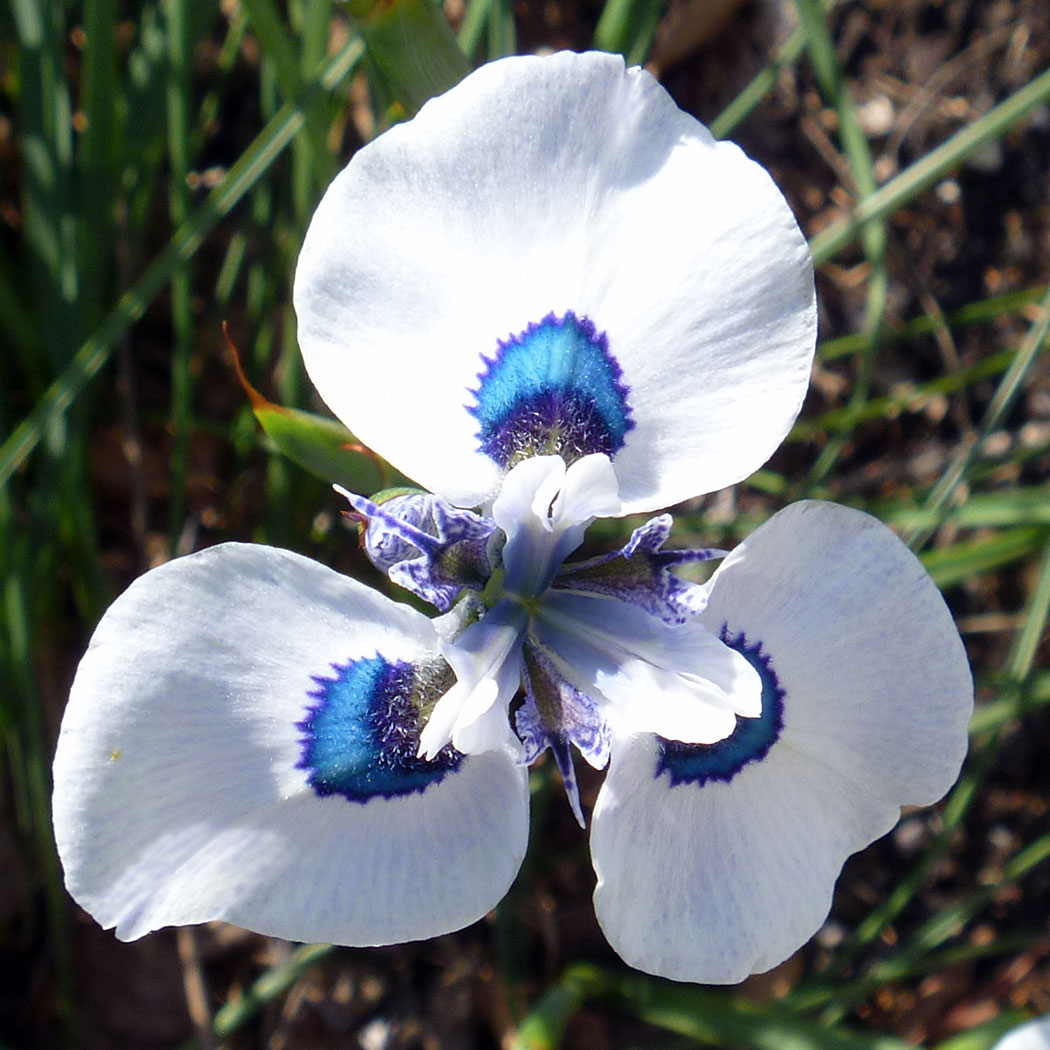
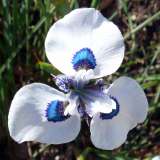
 Cool
Cool Temperate
Temperate Arid
Arid Semi-arid
Semi-arid Mild Tropical
Mild Tropical Tropical
Tropical